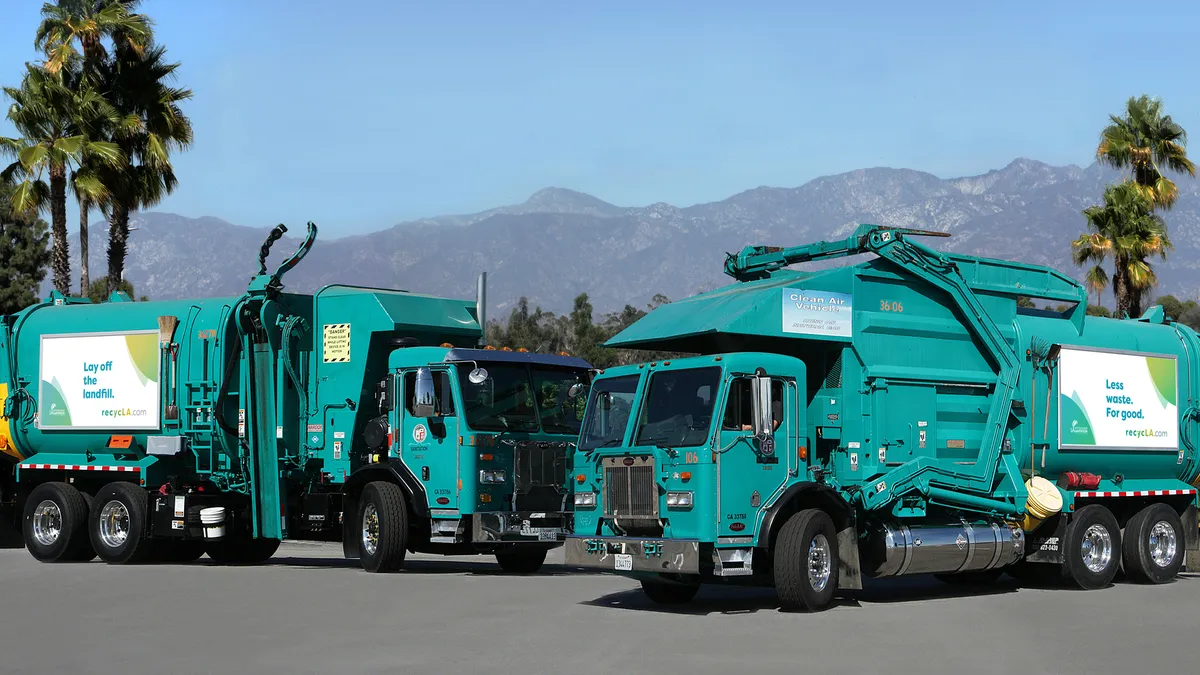Dive Brief:
- After months of discussion, the Los Angeles Board of Public Works (BPW) approved a new facility certification plan for the RecycLA franchise system on Oct. 29. This approval gives the Los Angeles Bureau of Sanitation (LASAN) authority to conduct monthly inspections to assess safety, recycling and performance standards at any facility accepting material from RecycLA service providers.
- One of the most notable aspects is a requirement for certain facilities to be fully enclosed. The deadline for facilities taking putrescible material is the end of 2023. For those taking blue bin recyclables, deadline is the end of 2026. Design plans are due in 2021.
- On Oct. 24, the BPW also approved a nearly $6.56 million contract amendment with consultant CH2M. According to the city, "Without these services, LASAN will not be able to meet the rise in the RecycLA related workload associated with meeting the many challenges the program is facing during the implementation and optimization phase," including ongoing lawsuits.
Dive Insight:
As detailed by Waste Dive last week, LASAN considers this facility certification plan to be a cornerstone of the entire RecycLA program. City officials believe it will give them more ability to track diversion rates, manage working conditions and ensure the program is living up to its environmental justice goals.
While the conversion of more than 500 collection vehicles to clean fuel is a notable step in that direction, the fact that many of the facilities being used for this program are concentrated in a handful of neighborhoods is a persistent issue. Local residents from the Pacoima and Sun Valley areas have come to testify about health effects multiple times at BPW meetings this year and showed up again in numbers this week.
“This is something that we committed to our residents and our customers of the RecycLA program," said BPW Commissioner Heather Repenning during the meeting. "It’s important for me that people know this is happening and we’re moving it forward."
Initial estimates anticipate the plan will encompass 40 or more facilities, some of which are currently under construction, and operators have been making their concerns known for months. While this plan was part of original contract terms, some say they would have altered their bids if they'd known how expensive it might be to comply.
Doug Corcoran, director of public services, said Waste Management was still "opposed to the program in its current state," and feared it would create "an entirely new layer of redundant bureaucracy." Corcoran also raised questions about whether the timeline for infrastructure upgrades was realistic given permitting requirements, said the same rules shouldn't apply to sites in less populated areas, and called reporting expectations “duplicative and unnecessary."
LASAN sought to mollify these concerns by highlighting perceived benefits of regular waste audits and the potential for well-performing sites to become exemplars of modern materials management. Officials said multiple sites had already received provisional approval and tried to frame themselves as a local partner.
“Our goal is not to issue suspensions or issue revocations, it’s to work with the facilities long before that ever happens to get them to the standards that we feel they need to be," said Dan Meyers, franchise division manager for RecycLA.
While various BPW commissioners recognized the potentially high costs involved, and the fact that some subcontractors might decide to not participate as a result, they pushed ahead.
As with the previously approved amendment — which will bring the city's contract with CH2M up to $16.76 million through FY19 — this is the latest sign that the cost of doing business under stricter standards is often higher. Whether RecycLA can justify the attendant price tag by living up to its environmental ideals remains to be seen, but it's become increasingly clear that the program is here to stay.














